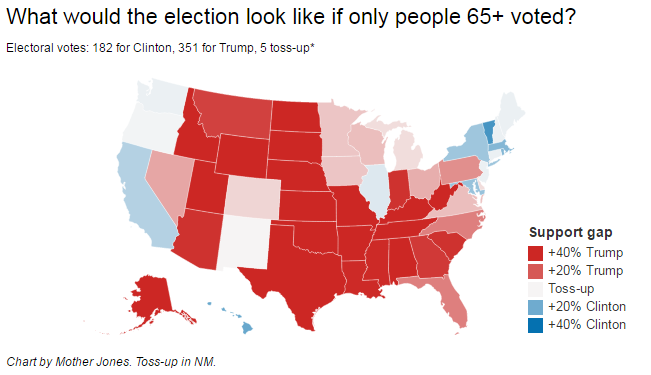Trump’s Win With the Old Seems a Regression to the Past
The 2016 election concluded last night in what was a surprise to people around the globe, with media mogul Donald Trump winning the Presidency over longtime politician Hillary Clinton. The breakdown of voter demographics was largely expected—with Clinton holding the minority vote while Trump subsisted largely on uneducated whites of both genders.
One subtle recent voter trend, however, became startlingly obvious as last night’s returns rolled in. The racial and geographic divides between the two candidates was well documented, but less prominent in projections of voter splits was the age difference between the two candidates’ constituencies.
Clinton won 54% of voters ages 18-29 to Trump’s 37%. This number, though seemingly middling, is high in light of the popular third-party options which drew ballots away from both candidates this year. Those aged 65 or over, however, voted oppositely: 54% for Trump and 43% for Clinton.
Understanding what the age breakdown means for our nation requires understanding the priorities of each age group. Younger voters are more concerned with expanding civil liberties, with scientific discovery and the environment, and with future stability. Older voters, however, are traditionally focused on maintaining the status quo and on preserving traditional morality.
What does that say, then, about the virtues that each candidate brings to the table? Voters of the younger generation—the ones who have the longest future ahead of them and who thus have the greatest stake in the future as opposed to the present—favor Clinton’s stances on increasing opportunity, protecting civil freedoms, and sustainable environmentalism. Older voters, however, cast their ballots for Trump in an attempt to maintain the status quo—one which promotes inequities between demographic groups and which preserves traditional ‘Americanism’ over looking to a more equal future.
Donald Trump’s policy messaging has been inconsistent since the beginnings of his Presidential run. His campaign slogan—the infamous ‘Make America Great Again’—and the symbolism behind it, however, has constantly propelled voters to his rallies, and yesterday, to the polls. ‘Make America Great Again,’ at first, seems to refer to a quintessential American idealism that we associate with the likes of Reagan or even Roosevelt. A closer look, however, reveals that the ‘greatness’ Trump and his supporters seek is one grounded in past biases and minority oppression. It is a sad sign of the times when America’s elderly seems so on board with such messaging.














Samantha • Nov 15, 2016 at 10:59 pm
Incredible article! I am highly impressed!!!
Zainab • Nov 11, 2016 at 2:50 pm
Great EDITORIAL! Glad to see students doing their research and supporting their perspectives with facts. I commend the writer on having an informed opinion unlike much of the rest of the country!
Alicia • Nov 11, 2016 at 10:28 am
We are not grounded in biases and minority oppression and to state such shows your lack of education. Again, check your facts. The people have spoken and what this means is they are tired of the same old politics that have gotten this country no where! Veterans before refugees and legal immigrants before illegals. Now I encourage you to serve your country and write based on fact and not your liberal opinion.
Alicia • Nov 11, 2016 at 10:24 am
DHS Press,
Printing such rhetoric is deplorable! “Uneducated white voters?” Really? Seems like a sore loser statement to me. Please check your facts before you write such statements and a skewed article!
Mallory Williamson • Nov 11, 2016 at 2:49 pm
Hi, thanks so much for reading! This article was an opinion piece–thus why it was filed under Op-Ed–and avoiding bias was not the goal. ‘Uneducated white voters’ in fact refers to a statistic tracked by many exit polls. People without college degrees are considered ‘uneducated’ for polling purposes. Referring to ‘uneducated white males’ is not a baseless judgment on Trump’s voters and rather was a demographic statistic.